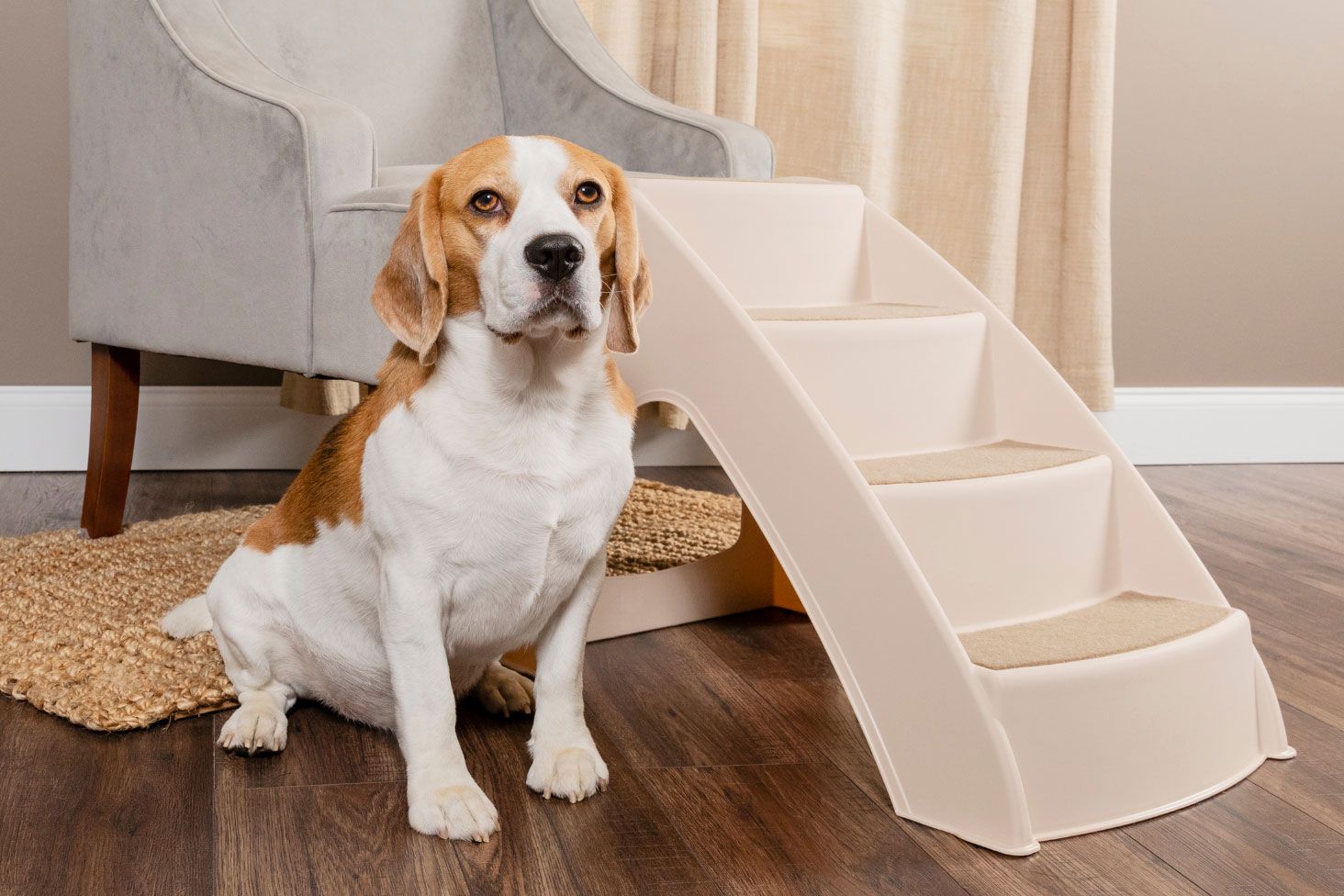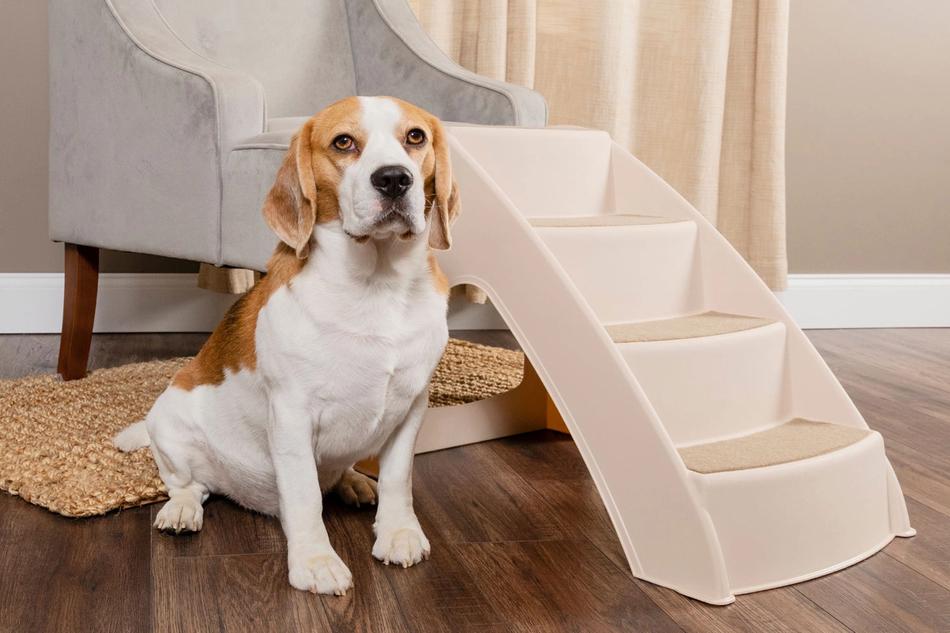Reviewed by Dr. Claudine Sievert, DVM
Deteriorating joints are a health concern that we share with our pets, especially as we get older together. Just like us, our dogs and cats can develop bad hips, knees, elbows and more. There are many ways to help a pet that’s getting on in years and needs support getting around the house or in and out of the car. However, the best way to deal with joint issues is to take proactive measures to prevent them while your pet is still young. Luckily, there are a variety of tools, therapies and tips available to help your young pets stay spry, and to help your older pets keep up.
When should you consider protecting your pet’s joints?
The short answer to this question is that it’s never too early. A puppy stops growing at between 6 and 24 months, depending on size (larger breeds tend to grow more slowly than smaller breeds,) and kittens generally stop growing at between 12 and 18 months. As with us humans, injuries during the growth phase can cause irreparable damage to joints. It’s important to keep this in mind when letting your puppy or kitten play, especially when they’re very young. Always play gently with your little friend and be careful to select playmates that are not much bigger than your pup or kitten. Many joint injuries occur when a small cat or dog plays too roughly with a much bigger playmate. As your pet matures, there are other things to watch for and other preventative measures you should keep in mind.
Veterinarian Claudine Sievert stresses the importance of recognizing problem areas early before joint issues can begin. “If you can recognize potential problem areas, then you have a good chance of preventing your dog from developing painful and crippling joint issues that may require costly and invasive surgeries to correct,” Dr. Sievert says.

What are common sources of joint wear and tear in pets?
Joint issues may arise from a variety of activities and incidents. Some effects are cumulative, the result of repeated mild impacts over a long period. Routine behaviors like jumping off the couch or the back of an SUV every day will take a toll on your pet’s joints over time. Some effects are acute, resulting from a sudden, severe impact or injury. For instance, dogs often tear ligaments in their knees when playing too intensely on uneven or slippery surface – much like when an athlete tears her ACL during a rigorous play.
Many pets sustain injuries like this in their own yard. “Make sure that all the surfaces are flat in the yard,” Dr. Sievert says, “Your dog may slip and fall on rough or round stones or stumble upon sticks or any other object lying around.”
Still other joint issues may be unpreventable; many pets are born with congenital joint issues and some of these may worsen over time. Obesity in pets also can increase the risk and the effects of joint issues.
What solutions can help prevent joint issues in pets?
Thankfully, there are many measures you can take to prevent joint issues for your pet. The best way to approach this is to think about how your pet’s daily activities impact his joints. Pay attention to how often he has to jump up or down from furniture, from your vehicle or other elevated spots. A handy dog ramp will work wonders to help your buddy avoid the repeated impacts of getting in and out of the car, as well as make it easier on everyone in situations like at the vet’s office or the groomer, where he might need help getting on or off a table. To prevent acute injuries like ligament tears, make sure your pet gets regular exercise in healthy moderation. Don’t overdo it, but be sure your pet gets to run and play frequently enough that his body is accustomed to the impacts of these activities. For pets with congenital joint issues, consult your vet.
Joint supplements for dogs, and cats
In addition to a healthy diet, Dr. Sievert recommends joint-support nutritional supplements. “Your pet should receive enough Omega-3 Fatty Acids, Vitamin D, Vitamin C, Anthocyanins, Polyphenols, Sulforaphane, Diallyl Disulfide, Glucosamine, and Chondroitin to effectively regenerate his or her joints. Well-balanced dog formulas along with nutritional supplements are your #1 investment in healthy joints.”
How to help my dog lose weight
One of the most important and simple ways to help any pet avoid joint deterioration is to maintain a healthy weight; resist the urge to spoil your buddy with too many treats, and don’t forget to exercise! “Do not forget to walk your dog on a regular basis,” Dr. Sievert says, “You can use walking as an effective exercise for the joints and muscles. Also, walking is extremely effective for weight management in your dog. And a dog that maintains a healthy weight is less prone to joint tear and wear.” And when it comes to exercise, don’t be afraid to think outside the walks! Dr. Sievert points out that “swimming is another great activity that can help your dog stay in shape. Swimming is also more effective than walking for weight loss and fat burning in dogs. And at the same time, it loads your pet's joints less.”
How can you help pets get around in your home?
Starting at home is one of the most effective ways to set your pet on the path to a lifetime of healthy joints. A simple set of folding pet steps is a perfect solution for a dog or cat who loves to hang out on the couch. Just fold them up to stash beneath the couch until you're ready to set them up for snuggle time! Ramps and steps are the two main styles of access products available to assist pets in getting around the house. Generally, pets with shorter legs do better with ramps than with steps. Steps are more useful in narrower places where a ramp would just be too steep. If you're not sure whether your pet should use a ramp or a step, or if you just want the benefits of each, then a steps & ramp combo might be just what you need.
Remember, your pet is never too young for you to start taking smart steps to ensure joint health. No matter your pet's age or condition, there are solutions available to help prevent or treat joint issues. Talk to your vet, keep an eye on your pet's activity, and remember to go easy on the treats!



